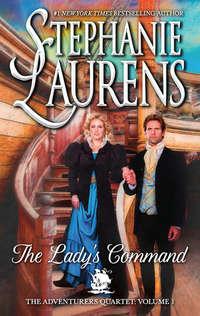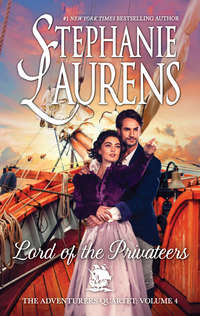
Полная версия
A Buccaneer At Heart
Robert wasn’t fooled by Declan’s noncommittal tone; he wouldn’t be tripping over his toes to ask any favors of Decker, either. Indeed, he hoped the vice-admiral remained at sea throughout his visit to the settlement.
“Regardless,” Wolverstone said, “I cannot stress enough how critical it is that whatever occurs while you’re on this mission, you must not at any point do anything to alert the perpetrators to any level of official interest. We must protect the lives of those taken—sending in a rescue team who find only dead bodies isn’t something any of us wish to even contemplate. Given that we cannot be certain who of those in authority in the settlement is involved, and conversely who is safe to trust, every action you take must remain covert.”
Robert nodded curtly. The more he heard—the more he dwelled on all he’d learned—remaining covert first to last seemed his wisest choice.
“So, Captain,” Melville said bracingly, “we need you to go into Freetown, follow the trail your brother has identified, and learn all the details of this nefarious scheme.”
Melville’s expression was a blend of belligerence and something much closer to pleading. Robert recognized the signs of a politician facing a threat beyond his control.
Before he could respond, Wolverstone softly said, “Actually, no.” Wolverstone caught Robert’s gaze. “We cannot ask you to learn all the details.”
From the corner of his eye, Robert saw Melville’s face fall as he stared at Wolverstone, who, in this matter, was effectively his mentor.
As if unaware of the angst he was causing, Wolverstone smoothly went on, “From what your brother has said, and from all I’ve learned from others over recent days, given that those effecting the kidnappings are slave traders, then I gather that in Freetown, as generally in that region, the slave traders will be operating out of a camp. They will hold their captives at that camp until they have a sufficient number to take to whoever they’re supplying. Further, the camp will almost certainly be outside the settlement’s borders, somewhere in the jungle, possibly some distance away.”
Wolverstone glanced at Declan, who, his expression impassive, nodded.
Imperturbably, Wolverstone continued, his gaze returning to Robert’s face, “Consequently, this mission is highly unlikely to be accomplished in only two stages. There will be however many stages we require to learn what we need to know, all without alerting the villains involved. Your brother”—he paused, then inclined his head to Edwina—“and Lady Edwina got us the first vital clues. They identified Undoto’s services as being a part of the scheme and gave us the connection to the slave traders. They also confirmed that those in high places in the settlement are involved, something we must strive never to forget. If Lady Holbrook was suborned, almost certainly others will have been as well.”
Wolverstone’s gaze cut to Melville, but although he looked dejected and, indeed, disgruntled, the First Lord made no attempt to interrupt.
“Therefore,” Wolverstone continued, “your mission must be to confirm the slave traders’ connection to Undoto and, by following the slavers, to identify the location of their camp. Your orders are specifically that. Locate the slavers’ camp, then return and report. You must not follow the trail further, no matter the temptation.”
Wolverstone paused, then added, “I appreciate that, very likely, that will not be an easy directive to follow—it’s not one I take joy in giving. But in order to mount a rescue of all those taken, it’s imperative we learn of the location of that camp. If you go further and are captured yourself...put simply, all those missing can’t afford that. If you are taken, we won’t know until your crew return to tell us. And once they do, we’ll be no further forward than we are now—no nearer the point of knowing enough to effectively rescue those taken.”
Wolverstone glanced at Melville; when he looked back at Robert, his features had hardened. “Running a mission in successive stages may seem like a slow way forward, but it is a sure way forward, and those taken deserve our best attempts to successfully free them.”
Robert met Wolverstone’s gaze; two seconds ticked past, then he nodded. “I’ll locate the slavers’ camp and bring the information back.”
Simple. Straightforward. He saw no reason to argue. If he had to sail to Freetown and do this mission, he was glad enough that it should have such a definite and definable endpoint.
Wolverstone inclined his head. “Thank you.” He looked at Melville. “We’ll leave you to prepare.”
Melville rose, as did everyone; he offered Robert his hand. “How long before you and your ship will be ready to depart?”
Robert gripped Melville’s hand. “A few days.” As hands were shaken all around and they moved toward the door, Robert thought through the logistics. He halted at the doorway and spoke to all. “I’ll send The Trident to Southampton to provision from the stores there. I imagine I’ll be able to set sail in three days.”
Melville humphed, but said no more. From his expression, Robert surmised that the First Lord was even more deeply troubled by the situation in Freetown than Wolverstone.
Then again, Wolverstone had no real responsibility to shoulder in this instance, while Melville...as Robert understood it, as First Lord, Melville had his neck metaphorically on the block, at least politically, and possibly even socially.
Robert returned to the armchair opposite the sofa. While Declan and Edwina farewelled their unexpected guests, he swiftly reviewed all he’d been told.
When Declan and Edwina reentered the drawing room and resumed their seats, he looked from one to the other. “All right. Now tell me all.”
As he’d assumed, the pair had a great deal more to impart to him of society in Freetown, of all the characters who had played even small parts in their own drama, of the sights, sounds, and dangers of the slums, and so much more that, he knew, could well prove helpful, and perhaps even critical, once he was on the ground in the settlement.
The hours slid by unnoticed by any of them.
When the clocks struck one, they repaired to the dining parlor and continued their discussions over a substantial meal. Robert grinned when he saw the platters being brought in. “Thank you,” he said to Edwina. “Shipboard food is good enough, but it’s nice to eat well when one can.”
Eventually, they returned to the comfort of the drawing room. Having exhausted all the facts and most of the speculation applicable, they finally turned to the ultimate question of what purpose lay behind the strange kidnappings.
Slumped in the armchair he’d claimed, his long legs stretched out before him, his booted ankles crossed, Robert tapped the tips of his steepled fingers to his chin. “You said that Dixon was the first to vanish. Given he’s an engineer of some repute, assuming he was chosen for his known skills, I agree that that suggests the enterprise our villains are engaged in is most likely a mine.”
Lounging on the sofa beside Edwina, Declan nodded. “At least in those parts.”
“So what are they mining?” Robert met his brother’s blue eyes. “You know that area better than I. What’s most likely?”
Declan twined his fingers with Edwina’s. “Gold and diamonds.”
“I assume not together, so what’s your best guess?”
“If I had to wager, I’d go for diamonds.”
Robert had a great deal of respect for Declan’s insights into all matters of exploration. “Why?”
Declan’s lips twisted. He glanced at Edwina. “I’ve been thinking about why those behind this have chosen to take young women and children—what uses they might have for them. Children are often used in gold mines to pick over the shattered ore—they’d be just as useful in mining for diamonds, at least in that area. But young women? They have no real role I can think of in gold mining. But in mining for diamonds in that area?”
Gripping Edwina’s hand, Declan looked at Robert. “The diamonds there are found in concretions, lumped together with other ore. Separating the ore from the stones is fine work—not so much precision as simply being able to work on small things. Young women with good eyesight could clean the rough stones enough to reduce their size and weight so that the final product, while keeping its value, would fit into a relatively small space—easy to smuggle out, even by mail.”
Declan held Robert’s gaze. “If I had to guess, I would say our villains have stumbled on a pipe of diamonds and are busy retrieving as many stones as they can before anyone else learns of the strike.”
* * *
Later that same day, in a tavern in Freetown located on a narrow side street off the western end of Water Street—an area frequented by clerks and shopkeepers and others more down at heel—a man rather better dressed than the other denizens sat nursing a glass of ale at a table in the rear corner of the dimly lit taproom.
The tavern door opened, and another man walked in. The first man looked up. He watched as the second man, also better dressed than the general run of the tavern’s clientele, bought a glass of ale from the man behind the counter, then crossed the room to the table in the corner.
The men exchanged nods, but no words. The second man drew up a stool and sat, then took a deep draft of his ale.
The sound of the door opening reached the second man. His back was to the door. He looked at the first man. “That him?”
The first man nodded.
Both waited in silence until the newcomer had bought an ale for himself and approached the table.
The third man set his glass down on the scarred surface, then glanced around at the others in the taproom before pulling up a stool and sitting.
“Stop looking so damned guilty.” The second man raised his glass and took another sip.
“All very well for you.” The third man, younger than the other two, reached for his glass. “You don’t have an uncle as your immediate superior.”
“Well, he’s not going to see us here, is he?” the second man said. “He’ll be up at the fort, no doubt busily sorting through his inventory.”
“God—I hope not.” The younger man shuddered. “The last thing we need is for him to realize how much is missing.”
The first man, who had silently watched the exchange, arched a brow. “No chance of that, is there?”
The younger man sighed. “No—I suppose not.” He stared into his ale. “I’ve been careful to keep everything we’ve taken off the books. There’s no way to see something’s missing if according to the books it was never there.”
The first man’s lips curved without humor. “Good to know.”
“Never mind that.” The second man focused on the first. “What’s this about Lady H? I heard through the office that she’s decamped on us.”
The first man flushed under his tan. His hands tightened about his glass. “I was told Lady H had gone to visit family, and for all I know, that might still be the case. So yes, she’s gone, but as she knows nothing about my connection to our operation, she didn’t see fit to explain her reasons to me. I asked around—indirectly, of course—but apparently Holbrook doesn’t know when she’ll be back.”
“So we might have lost our ability to vet our kidnapees?” The second man frowned.
“Yes,” the first man replied, “but that isn’t what most concerns me.” He paused to take a sip of his ale, then lowered the glass and went on, “Yesterday, I heard from Dubois that Kale claims he lost two of the three men he sent to the governor’s house to fetch some lady Lady H had sent word to them to come and get.”
The third man looked puzzled. “When was that?”
“As near as I can make out, it was fifteen nights ago. Three days before Lady H sailed. I spent the evening in question dealing with dispatches, so I knew nothing about it at the time.” The first man paused, then more diffidently went on, “From what I could gather, it was Frobisher’s wife, Lady Edwina, who came to see Lady H that evening, but I can’t be certain Lady Edwina was the lady Lady H called Kale to come and get, and I see no point in asking too many questions of the governor’s staff.
“According to Dubois, Kale said that the lady his men picked up was drugged and asleep. All his man—the one who survived—could tell him was that the lady had golden hair. In their usual team of three, Kale’s men wrapped her in a rug and carried her out through the slum behind the house, but then they were attacked by four men—sailors, according to the survivor. The sailors killed two of Kale’s men and took the lady back. Kale’s third man ran, but then doubled back and trailed the sailors to the docks. He saw them get into a tender and be rowed off, but in the dark, he couldn’t tell which ship they boarded.”
The second man continued to frown into his glass. “If I’m remembering aright, Frobisher’s ship was in the harbor that night. It wasn’t there the next day—they must have left on the morning tide.”
The first man humphed. “Word is that they—Frobisher and Lady Edwina—were on their honeymoon and were headed to Cape Town to visit family there. If that’s so, then even if it was Lady Edwina who Lady H drugged—God alone knows why the silly bitch would do such a thing, but if she did—I can’t imagine we’ll hear any more about it.”
The third man stared at the first. “But...surely Frobisher will lodge some sort of official complaint with Holbrook?”
The first man grinned. “I doubt it. Lady Edwina’s the daughter of a duke—very highly placed within society in London. I really can’t see Frobisher wanting to draw attention to his wife being in the hands of the likes of Kale’s men, in the night, in the slum, no one else about. Not the sort of thing he’d want known about his wife.”
“I agree.” The second man nodded. “He’s got her back, and by the sounds of it, no harm done. He’ll leave it at that.” He paused, then added, “If Frobisher had wanted to make anything of it, he wouldn’t have sailed without pounding on Holbrook’s desk. He didn’t, so I agree—that’s that.” He cut a glance at the third man. “No need to borrow trouble on that account.”
The first man leaned his chin on one hand. “And I don’t think we need to fear Lady H giving us up to anyone, either. She has far more to lose than we do. The only reason she agreed to Undoto’s suggestion was for the money—that’s really all she cared about. And if it was Lady Edwina she tried to drug and send off to Kale, then once she learned that Lady Edwina had been rescued, I can quite understand Lady H wanting to make herself scarce. I would, too. But if that’s the case, it’s better for us that she’s taken herself off—we wouldn’t want her to be waiting here to be asked any awkward questions if any are ever directed this way.”
The second man grunted. “She doesn’t know enough to point the finger at us, anyway.”
The first man dipped his head. “True. But she might have pointed at Undoto, or given up her contact with Kale, and that might have started things unraveling... No. Overall, we should be glad she’s gone. But if she has done a flit for good and all, then the one thing we do need to work on is how to cover for her expertise.” The first man looked at the other two and raised his brows. “Any notion how we’re to vet those we take to make sure their disappearance doesn’t set off any alarms?”
Silence ensued.
Finally, the second man raked his hand through his thick black hair. “Let’s leave that for now, but keep alert for any possible other way. As of this moment, Dubois has enough men for his needs.”
“But he says he’ll need more,” the first man countered. “He said Dixon’s not far from opening up the second tunnel, and once he does, if we want to increase production like we’ve promised our backers, then Dubois will need more men.”
“So he’ll need them soon, but not immediately.” The second man nodded. “No need to panic. We’ll find a way.”
“What about women and children?” the third man asked.
“Dubois said he has enough of both for now.” The first man turned his glass between his hands. “He won’t need more until they start hauling rock from the second tunnel.”
The three fell silent, then the second man humphed. “I hope Dixon can be trusted to do what’s needed.”
The first man’s lips quirked. “Dubois was very confident that in order to keep Miss Frazier safe and unmolested, Dixon will perform exactly as we wish.”
The second man grinned. “I have to say that Dubois’s notion of using the women’s safety to control the men has proved nothing short of inspired.”
The first man grunted and pushed away his empty glass. “Just as long as the men don’t think ahead and realize that, when we have all we need from them, it’s all going to come to the same thing in the end.”
* * *
A gray dawn was breaking far to the east as Robert steered The Trident down the last stretch of the Solent. The day was overcast and blustery, the waves a choppy gray-green, but the wind gusted from the northeast, which made it damned near perfect sailing, at least to him.
He’d risen in the small hours and had jockeyed The Trident into position to be one of the first ships to heel out on the surging tide. With the way clear before the prow, he’d called up the sails in rapid succession. Ships like The Trident were best sailed hard, with as much canvas flying as possible; they were designed to race over the waves.
The buoys at the Solent’s mouth came into view, rising and falling on the swell. Robert corrected course, then, as the first of the Channel’s rolling waves hit, swung the wheel. He called rapid sail changes as the ship heeled; the crew scurried and shouts flew as the sails were adjusted, then The Trident was shooting into the darker waters of the Channel, prow unerringly on the correct heading to take them out into the Atlantic on the most southerly tack.
Once the ship steadied, he checked the sails, then, satisfied, handed the wheel to his lieutenant, Jordan Latimer. “Keep her running as hard as you can. I’ll be back for the next change.” That would come when they swung even further to the south to commence the long haul to Freetown.
Latimer grinned and snapped off a salute. “Aye, aye. I take it we’re in a hurry?”
Robert nodded. “Believe it or not, The Cormorant made the trip back in twelve days.”
“Twelve?” Latimer let his disbelief show.
“Royd put a new finish on the hull and fiddled with the rudder. Apparently, if running under full sail, it shaves off nearly a sixth in time—Declan’s master reported The Cormorant was noticeably faster even on the run from Aberdeen to Southampton.”
Latimer shook his head wonderingly. “Pity we didn’t have time for Royd and his boys to doctor The Trident before we set out. We’ll never make it in twelve days.”
“True.” Robert turned to descend to the main deck. “But there’s no reason we can’t make it in fifteen, as long as we keep the sails up.”
If the winds held steady, they would. He went down the ladder to the main deck, then paced along the starboard side, checking knots, pulleys, and the set of the spars, listening to the creak of the sails—the little things that reassured him that all was right with his ship.
Halting near the bow, he glanced back and checked the wake, all but unconsciously noting the way the purling wave broke and the angle of the hull’s cant. Seeing nothing of concern, he turned and looked ahead to where, in the far distance, the clouds gave way to blue skies.
With luck, when they reached the Atlantic, the weather would clear, and he would be able to cram on yet more sail.
The ship lurched, and he gripped the rail; as the deck righted, he leaned against the side, his gaze idly sweeping the seas ahead.
As he’d predicted, it had taken three days for The Trident to sail from London to Southampton and to be adequately provisioned from the company’s stores there. Add fourteen more days for the journey south, and it would be eighteen days since he’d agreed to this mission before he sighted Freetown. Fourteen full days before he could start.
To his surprise, impatience rode him. He wanted this mission done and squared away.
The why of that had been difficult to define, but last night, as he’d lain in his bed in the large stern cabin—his cold, lonely, and uninspiring bed—he’d finally got a glimpse of what was driving his uncharacteristically unsettling emotions.
After three full days spent with Declan and Edwina, he wanted what Declan had. What his brother had found with Edwina—the happiness, and the home.
Until he’d seen it for himself, until he’d experienced Declan’s new life, he hadn’t appreciated just how deeply the need and want of a hearth of his own was entrenched in his psyche.
Put simply, he envied what Declan had found and wanted the same for himself.
All well and good—he knew what that required. A wife. The right sort of wife for a gentleman like him—and that was definitely not a sparkling, effervescent, diamond-of-the-first-water like Edwina.
He wasn’t entirely sure what his wife would be like—he had yet to spend sufficient time dwelling on the prospect—but he viewed himself as a diplomat, a man of quieter appetites than Royd or Declan, and his style of wife should reflect that, or so he imagined.
Regardless, all plans in that regard had been put on hold. This mission came first.
Which, of course, was why he was so keen to have it over and done.
He pushed away from the side and headed for the companionway. He dropped down to the lower deck and made his way to his cabin. Spacious and neatly fitted with everything he needed for a comfortable life on board, the cabin extended all the way across the stern.
Settling into the chair behind the big desk, he opened the lowest drawer on the right and drew out his latest journal.
Keeping a journal was a habit he’d acquired from his mother. In the days in which she’d sailed the seas with his father, she’d kept a record of each day’s happenings. There was always something worthy of note. He’d found her journals as a boy and had spent months working his way through them. The insight those journals had afforded him of all the little details of life on board influenced him to this day; the impact they’d had on his view of sailing as a way of life was quite simply incalculable.
And so he’d taken up the practice himself. Perhaps when he had sons, they would read his journals and see the joys of this life, too.
Today, he wrote of how dark it had been when they’d slipped their moorings and pulled away from the wharf, and of the huge black-backed gull he’d seen perched on one of the buoys just outside the harbor mouth. He paused, then let his pen continue to scratch over the paper, documenting his impatience to get started on this mission and detailing his understanding of what completing it would require of him. To him, the latter was simple, clear, and succinct: Go into the settlement of Freetown, pick up the trail of the slavers, follow them to their camp—and then return to London with the camp’s location.
With a flourish, he set a final period to the entry. “Cut and dried.”
He set down his pen and read over what he’d written. By then, the ink had dried. Idly, he flicked back through the closely written pages, stopping to read entries here and there.
Eventually, he stopped reading and stared unseeing as what lay before him fully registered. Unbidden, his gaze rose to the glass-fronted cabinet built into the stern wall; it contained the rest of his journals, all neatly lined up on one shelf.
The record of his life.
It didn’t amount to much.
Not in the greater scheme of things—on the wider plane of life.
Yes, he’d assisted in any number of missions, ones that had actively supported his country. Most had been diplomatic forays of one sort or another. Since his earliest years captaining his own ship, he’d claimed the diplomatic missions as his own—his way of differentiating himself from Royd and Declan. Royd was older than him by two years, while Declan was a year younger, but they were both adventurers to the core, buccaneers at heart. Neither would deny that description; if anything, they reveled in being widely recognized as such.









